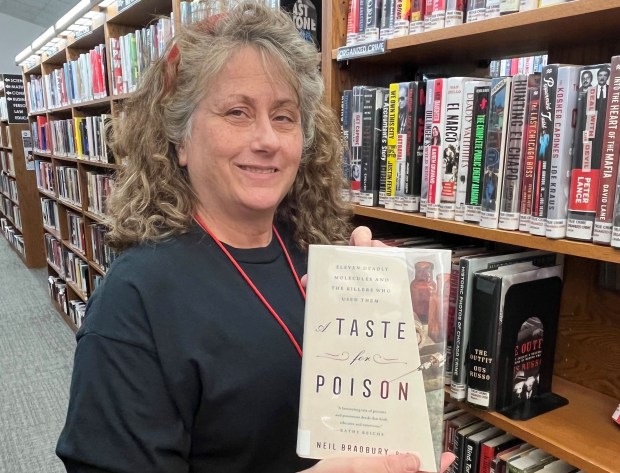With luck, most people won’t need to know what it feels like to be dosed by deadly cocktails, taste a killer curry or have a brush with a lethal umbrella.
But just in case, a program is scheduled this month at the Frankfort Public Library District that could save lives. Medical biochemist and author Neil Bradbury will explore the effects of poisons on the human body and discuss the motives of murderers during A Taste of Poison, from 7 to 8 p.m. April 9 at the library.
“Hopefully what is going to happen is you will learn something,” Bradbury said. “For example, you will learn the symptoms of different poisons, so if you are poisoned you can tell the paramedics which poison you’ve been poisoned with.
“I also expect you’ll have some fun. You’ll be exposed to true crimes, a little history. Ultimately, I hope you’ll have an enjoyable evening.”
The program is free and open to anyone but requires registration because space is limited.
“True crime and murder mysteries have always fascinated people. They are always the top sellers in books. You can go on any TV channel and see some kind of murder mystery, “CSI”-type shows,” Bradbury said. “I think it’s also true that I point out in the book that everybody eventually gets caught and convicted, so there is some sense of justice that even though they try to get away with murder, they are ultimately caught.”
Bradbury, a professor of physiology and biophysics at Rosalind Franklin University of Medicine and Science in North Chicago, is a graduate of the University of St. Andrews in Scotland and the University of Wales School of Medicine. He became interested in poisons and the killers who use them when he was young.
“As a child I loved reading murder mysteries: Agatha Christie, Conan Doyle, PD James. People like that. In a lot of their stories, poisons were used, but I found it frustrating that a lot of times it wasn’t described what the poisons did.
“Someone was killed with cyanide. Why is that bad? Why does it kill you?” he asked. “I found it frustrating that that information wasn’t there. I became curious. As a scientist, it kind of bugged me that I didn’t understand what was going on.”
That, paired with his love of history, inspired his 2022 book, “A Taste of Poison: Eleven Deadly Molecules and the Killers Who Used Them.”
“I couldn’t find the kind of book that I wanted to read about the topic, so I decided I’d write the kind of book I want to read. It combines history, science, true crime – hopefully not in an entirely morbid fashion, but I wanted it to be available to explain the science.”
Another hope for the book is that it will help people discover that science can be fun, no matter what they may have experienced in school.
“Part of writing the book for the general public is to convey a sense that science is accessible and you don’t have to have a degree. It can be fun and interesting,” he said. “It seems that murder and true crime and poison, any TV shows you can think of, focus on that end: to explain the science of the body in a way people can appreciate. And put a twist on poison and true crime that I didn’t find out there before.”
Bradbury’s book was selected as part of the Illinois Reads program for 2024, which means libraries will have it available and a special book signing will take place at the Illinois State Fair later this year when all of the books in the program will be presented. “It’s now available in nine languages,” he added.
He said his family has been very supportive about his passion, although one person was a little wary at first.
“Initially my wife was a little concerned about finding poisons on the computer that I was looking up, although she was comforted that the book had been published and she was in no danger. … I suppose if I had been planning it, leaving the pages on the computer wouldn’t be the best way!” he joked.
Bradbury had a hard time deciding which poisons to include in the book, which took him about two years to write.
“The way in which I did it was by appreciating that not every poison works in exactly the same way. They all have different effects on the body,” he said. “I wanted to get a broad range of different poisons and how they work. Some affect the nervous system. Some poisons affect every part of the body by shutting down its energy. The poisons work in slightly different ways, so that was the way I went about selecting these 11.”
He actually has a favorite poison: polonium, a radioactive poison used in 2006 to assassinate former KGB agent Alexander Litvinenko, who had fled Russia amid a government shakeup. He was poisoned when it was placed in a pot of tea in a restaurant at a hotel in London, where he was living as an expatriate.
“The reason I find this particularly interesting is because I have had afternoon tea at that exact restaurant,” Bradbury said. “I will confess that the last time I dragged my family over to London, one of the things I absolutely demanded we do was have afternoon tea in the restaurant at the hotel where Litvinenko was poisoned.
“We all survived,” he joked. “I thought it was fascinating to be within inches of where this murder took place. It was not natural. The people who committed the poison actually did escape. They flew back to Moscow and there is no extradition for them even though there are arrest warrants for them in London.”
Bradbury’s love of poisons is reflected on his website, neilbradbury.org, which features a photo of the Poison Garden at Alnwick Castle in Northumberland, England. The castle should be familiar to fans of “Harry Potter” movies because many scenes were filmed there.
“I was privileged to be invited to be an honorary tour guide last year at the poison garden. I was with some of the head gardeners taking tours around for people who came to visit the gardens. We went through the poison garden discussing plants present in the poison garden,” he said.
“In an average year they have an average of 143 people who faint during the tour. I was responsible for four of those, apparently,” he said, adding that the fainting is “entirely psychological” because of the stories involved.
He pointed out that he was in the gardens for three days. “There’s nothing in the air. There’s nothing that’s really deadly. … There really is no danger involved in going on a tour.”
The garden was originally designed “as an outreach by the duchess for education against drugs so they have drug plants there, marijuana, cannabis plants, cocaine,” Bradbury explained. “It was an outreach tool for drug prevention and they do bring high school groups around but they’ve also expanded to include a lot of poisonous plants.”
Bradbury and his book are a perfect fit for the Frankfort library, according to Rebecca Cerf, of adult library services, who also leads the library’s Coffee Cake & Crime book discussion group.
“I thought a book about using various poisons as a means of murder would be an interesting read for our group and a discussion with Dr. Bradbury at the library would be even more fun and engaging,” she said.
The Coffee Cake & Crime book club will discuss his book April 5, and the Nonfiction at Night book club will discuss it on April 8. His presentation is the next night.
“Dr. Bradbury’s discussion of the various molecules that make up each of the poisons covered in his book and how they affect the body will give an interesting and scientific insight, but the discussion of real-life cases and examples of how they have been used will make for a fascinating presentation,” Cerf explained. “I really can’t say why people are fascinated with mysteries, but there seems to be a psychological basis for people to be drawn to disaster/danger but be at a safe distance to observe and potentially learn from it.”
Ever the librarian, to accompany the book clubs and the presentation, Cerf planned to put up a “poison book display” that will feature books gears toward mysteries with poisons.
No library card is required to register for the event, which can be done at the website or by calling 815-469-2423.
Bradbury is appreciative that the discussion groups and others enjoy reading his book. “Honestly, it makes me feel very gratified that people find this interesting. That was part of what I hoped for when I wrote the book is that people would be interested in the topic and would see it from a different angle that maybe they haven’t thought about it for,” he said. “So the fact that they find it worthy of their time is very gratifying to me.”
Melinda Moore is a freelance reporter for the Daily Southtown.





